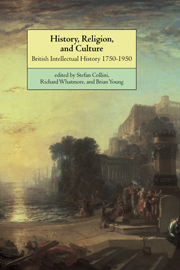Book contents
- Frontmatter
- Contents
- Preface
- General introduction
- Presentation of History, Religion, and Culture
- Part I
- 1 Historical distance and the historiography of eighteenth-century Britain
- 2 Gibbon and the primitive church
- 3 Gibbon's religious characters
- Part II
- Part III
- List of contributors
- Acknowledgements
- Index
2 - Gibbon and the primitive church
Published online by Cambridge University Press: 03 December 2009
- Frontmatter
- Contents
- Preface
- General introduction
- Presentation of History, Religion, and Culture
- Part I
- 1 Historical distance and the historiography of eighteenth-century Britain
- 2 Gibbon and the primitive church
- 3 Gibbon's religious characters
- Part II
- Part III
- List of contributors
- Acknowledgements
- Index
Summary
The fifteenth and sixteenth chapters of Edward Gibbon's History of the Decline and Fall of the Roman Empire present a number of problems to scholars. They are far from being the whole of what Gibbon has to say about the history of Christianity; indeed, I am prepared to argue both that they are no more than preliminary to that history, which for Gibbon's purposes begins with the Council of Nicaea, and that they are an unsatisfactory prelude, with the consequence that they have been read out of context and made a touchstone by which the Decline and Fall as a whole has been judged. But to make these claims is to leave in want of a solution the problems of how Gibbon came to write them as they are, and how his critics and adversaries came to read them as they did. We may pursue with David Womersley – whose recent edition of most of the replies to chapters 15 and 16 has added to the debt all Gibbon scholars owe him – the question of the exact nature of Gibbon's unbelief and the ways in which he represented it to his public. Or we may enquire into the place these chapters occupy in the structure of the Decline and Fall as a narrative sequence, and ask what this enquiry may tell us about the processes by which he came to write it. These alternatives cannot in fact be separated, for if the two chapters fit ill into the Decline and Fall, we need all the more to know why Gibbon needed to write them.
- Type
- Chapter
- Information
- History, Religion, and CultureBritish Intellectual History 1750–1950, pp. 48 - 68Publisher: Cambridge University PressPrint publication year: 2000
- 1
- Cited by



